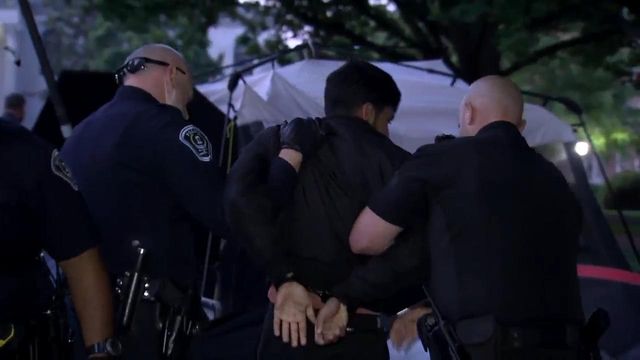Outside review finds flaws in 190 SBI prosecutions
Analysts at North Carolina’s State Bureau of Investigation crime lab omitted, overstated or falsely reported blood evidence in dozens of cases, including three that ended in executions, according to an independent review released Wednesday.
The government-ordered report by two former FBI officials found that SBI agents repeatedly aided prosecutors in obtaining convictions over a 16-year period, mostly by misrepresenting blood evidence and keeping critical notes from defense attorneys.
It calls for a thorough examination of blood evidence in 190 criminal cases from 1987 to 2003, stating that, at times, “information that may have been material and even favorable to the defense of an accused defendant was withheld or misrepresented.”
"No one should conclude that someone has been wrongfully convicted," said one of the review's authors, Chris Swecker, at a news conference Wednesday.
The review of more than 15,000 case files by Swecker and Mike Wolf, both former assistant FBI directors, found 230 cases in which eight SBI analysts filed incomplete reports. In 40 of the cases, no suspect was ever charged.
Swecker emphasized that the standard of review was very broad. In some cases, he said, there were hundreds of items tested where only one instance of a negative or inconclusive result wasn't reported.
Neither he nor Wolf looked to see if the evidence was introduced at trial.
"There's a lot of material to look at – district attorney files, (whether) the lab notes were handed over, (whether) the item was introduced into evidence," Swecker said.
Both recommend that prosecutors and defense lawyers need to check whether tainted lab reports helped lead to confessions or pleas.
"I firmly believe, in the interest of justice, that the full case files in each of these cases should be reviewed by both prosecutors and appropriate defense counsel to determine if any of these cases should be reopened," Attorney General Roy Cooper said.
Cooper ordered the review in March after SBI agent Duane Deaver testified in the February innocence case of Gregory Taylor that the crime lab once had a policy of excluding complete blood test results from reports offered to defense attorneys before trials.
Deaver’s testimony led to Taylor's exoneration after he served nearly 17 years in prison for first-degree murder.
Gregory S. McLeod, the director of the SBI, said Deaver was on leave with pay from the agency while the investigation was being completed.
Besides the executions, the report urged a closer look at the cases of four people on death row and one whose death sentence was commuted to life.
The cases also include the 1993 murder of James Jordan, father of NBA star Michael Jordan, who was sleeping in his car along a highway when he was killed.
Two men were sentenced to life in prison. The review states an SBI analyst reported that an examination of the scene indicated the presence of blood but didn’t say that four subsequent tests were inconclusive.
The report blames the flaws on “poorly crafted policy, inattention to reporting methods which permitted too much analyst subjectivity; and ineffective management and oversight.”
The lab’s operations have changed substantially since 2003, when it began using more modern blood testing. Prosecutors also now have online access to all lab files, and can make them available to defense attorneys.
Among the report’s recommendations are: automation of historical lab files; posting of lab policies on a public website; and the appointment of an ombudsman to review lab issues or mistakes.
Cooper said that his longtime legislative liaison, who was sworn in last week as SBI director, has already been working on implementing the recommendations.
"This report is troubling. It describes a practice that should have been unacceptable then and it is unacceptable now," Cooper said. "There is clearly work to do. The lab cannot accept a lack of thoroughness. It cannot accept attitudes that are not open to the possibility that a mistake has been made. It cannot ignore criticisms and suggestions from the outside."
James Coleman, a professor of law at Duke University, said the impact of the report stretches far beyond individual cases.
“I think the justice system took a big hit in this review, and I think the trust that the public had in this agency has been destroyed,” Coleman said.
A long-time critic of the agency, Coleman also said the SBI’s shortcomings have created a public safety concern.
“If they don't care what the truth is and they simply want to put away people, then there is a concern that real perpetrators are being left on the streets,” he said.











